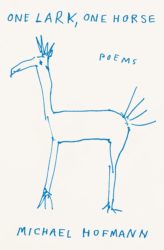Poetry Review: “One Lark, One Horse” — Michael Hofmann’s Comic Skepticism
By Ed Meek
Michael Hofmann nicely captures our age of truthiness and alternate facts and multiple perspectives, the hollowness of everything from the news-cycle to pop-up restaurants, all of the distractions driven by money and advertising.
 One Lark, One Horse by Michael Hofmann. Farrar, Strauss and Giroux, 87 pp., $23.00
One Lark, One Horse by Michael Hofmann. Farrar, Strauss and Giroux, 87 pp., $23.00
Michael Hofmann is in that small, eclectic, erudite group of internationally recognized poets that includes Frederick Seidel, Jorie Graham, Paul Muldoon, etc. He is well-known as an excellent critic and translator from the German. This is his first book of poems since 1999. During that protracted interregnum he said “I’ve forgotten what a poem is — or worse can only remember.” In this new collection, he appears to have remembered. He has a self-deprecating sense of humor that is similar to Seidel’s. The title of the book comes from a joke about two Jewish deli owners. One, Goldberg, has a much more successful business. “What’s your secret?” Cohen asks him. “Lark pâté ,” he says. “But how can you afford it?” “I add a bit of horse,” Goldberg says. “How much?” “One lark, one horse,” says Goldberg. Is this a metaphor for Hofmann’s book or just a joke? Here’s the first poem:
And still I didn’t give one.I might have been a virtual casualty,
A late victim of the Millennium Bug.No spontaneity, no insubordination,
Not even any spare capacity.
It’s a brief explanation of his absence from poetry writing; it is witty, although it give us too much to go on. Hoffman likes to take on a number of different sources and topics for poems: a ride along the Hudson, Brexit, Australia, poems for Seidel and Auden, commentary on the age we live in.
Hashtags, and pop-ups and calculating interesticles, more clickbait,
More straight-faced, bare-faces, faceless, baseless
Counter-allegations, more red herrings, crossed fingers,
Rehearsed answers, turned tables, impossibilities
Before breakfast, more ‘accepting responsibility’, less truth.
Lusher menus. Bigger bonuses. Less contrition. More Shamelessness.
Less truth.
Hofmann nicely captures our age of truthiness and alternate facts and multiple perspectives, the hollowness of everything from the news-cycle to pop-up restaurants, all of the distractions driven by money and advertising. And he does this with a playful tone that makes use of internal rhymes and surprising twists of examples.
In a poem entitled “Auden,” Hofmann refers to an earlier time period, maybe the ’40s or ’50s, when the celebrated writer was in his prime. “It was another world, the world of turned collars and polished shoes…” It does seem now to be a completely different world:
heavy, leather-effect cardboard…The world of facecloths and napkin rings and coal-
scuttles…And shoe trees and tie racks and plumped down
pillows and cufflinks and weskits and hats
And hardbound children’s books for our hardbound
children …How careless, cheap and profligate we have become…
How true! Details like this bring back images and memories. They are not our reality, but evoke the visual in old movies: Cary Grant and Jimmy Stewart and Katherine Hepburn dressed up for dinner in The Philadelphia Story, then enjoying a cocktail by the pool in the moonlight. Americans with money were more formal then, as was the poetry of Auden. Of course, that formality had its drawbacks. The hardbound books were nice — the hardbound children, not so much.
Later in the book, Hofmann has a funny send-up called “On Forgetting.” It begins
I think I originally learned it in my teens.
Now I sometimes find it by alphabetizing, but most of
the time it’s gone and stays gone.
I don’t know if I dislike it because I can’t remember it,
or I can’t remember it because I dislike it.
It’s as though it’s on permanent loan somewhere…
He goes on to list places he has gotten lost in, times he’s mixed up terms or events. “I disappear into my room to look for a book, / and merge hours later with the wrong one, or with none at all.” For those of us who are getting older, these ‘senior moments’ sounds very familiar. But Hofmann is only 62! Plenty of time to write more poetry. As long as he can continue to remember what poetry is. For all of our sakes.
Ed Meek is the author of Spy Pond and What We Love. A collection of his short stories, Luck, came out in 2017. WBUR’s Cognoscenti featured his poems during poetry month last year.

